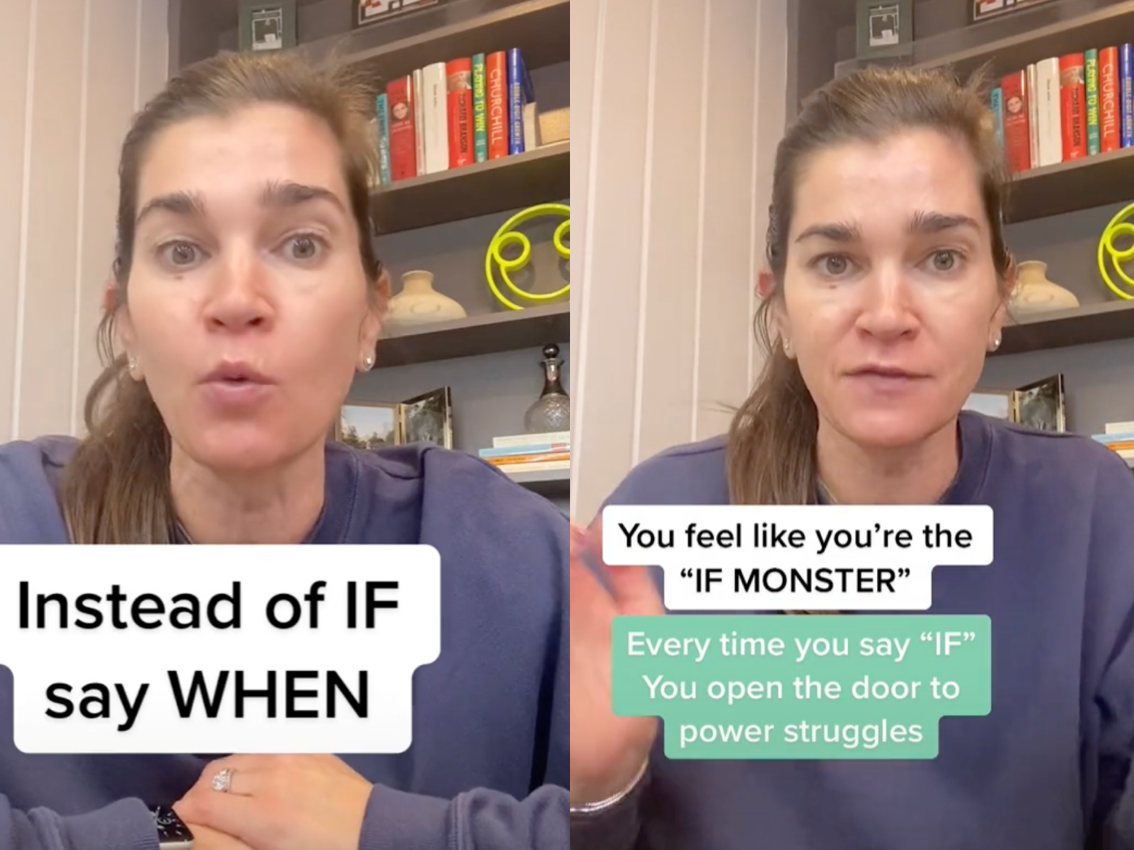The Independent's journalism is supported by our readers. When you purchase through links on our site, we may earn commission.
Parenting coach explains how using ‘when’ instead of ‘if’ helps discipline children better
‘Started doing this and zero power struggles!’ one respondent writes in the comments

Your support helps us to tell the story
From reproductive rights to climate change to Big Tech, The Independent is on the ground when the story is developing. Whether it's investigating the financials of Elon Musk's pro-Trump PAC or producing our latest documentary, 'The A Word', which shines a light on the American women fighting for reproductive rights, we know how important it is to parse out the facts from the messaging.
At such a critical moment in US history, we need reporters on the ground. Your donation allows us to keep sending journalists to speak to both sides of the story.
The Independent is trusted by Americans across the entire political spectrum. And unlike many other quality news outlets, we choose not to lock Americans out of our reporting and analysis with paywalls. We believe quality journalism should be available to everyone, paid for by those who can afford it.
Your support makes all the difference.A mother and parenting coach has revealed how using “when” instead of “if” during disagreements between parent and child can make all the difference.
On TikTok, Tia Slightham, @parentingcoach, often shares videos detailing her strategies and tactics when it comes to parenting and tips on how to transform those skills.
In a clip posted last November, Slightham revealed one of her best parenting hacks, which simply involves changing the language used with kids.
“If your house sounds like this, then I wanted you to make one simple change,” she said.
She went on to explain scenarios when parents are disciplining their children and using the word “if” to do so. For example, a parent could say: “If you don’t get ready for bed, no books” or “If you don’t eat your dinner, no dessert.”
According to Sligtham, constantly using the word “if” could actually be doing more harm than good.
“Every time you say ‘if,’ you open the gate to power struggles,” she said. “Every time you say ‘if,’ you open the door to argue with your kids to overpower your kids.
“Every time you say ‘if,’ you end up picking your tug-of-war rope up and your kids pick up theirs to battle you back and see who will win because we can’t force our kids to do this,” she added.
So instead of using ‘if’, Slightham recommends switching this word to ‘when.’ As opposed to “if you don’t get ready for bed, no books,” you could say: “when you’re ready for bed, we’lls do books”.
“When you’re done with your dinner, then it’s time for dessert,” Slightham explained, as another example of how to use this word. “When you’re ready to go, then you can tell me it’s TV time.”
This video has over 2.3m views so far, with some viewers in the comments saying that they took Sligtham’s advice and saw some major results.
“I did this and the biggest shift. I let her express herself and I truly listen. she is 6 and a very balanced child,” one wrote.
“Started doing this and zero power struggles!” another wrote. “If they take too long then we don’t have time for the ‘when’ thing.”
Many TikTok users also agreed that using the words “when” and “if” are both helpful in the right context, one of which said: “When and then statements are game changers!!! If/then statements can be powerful for some kids too if they aren’t just empty threats & punishment.”
On the opposite side of the coin, some viewers felt that there were some drawbacks to using the word “when”.
“When you finish getting ready, we have already missed the bus,” one explained. “I need something to get them moving now, not when they’re ready.”
“With bedtime, using ‘when’ means they have the expectation of books when they are ready regardless of what time it is. Not possible,” another comment reads.
Speaking to The Independent, Slightham reiterated how using “if” can make kids feel like their parents are going to overpower them in the situation.
“Switching “if” to “when” allow kids to feel as though they have a choice to do what needs to be done so they can have the things they desire or want to do,” she explained. “The idea is to parent without overpowering. The key is learning the skills to do this morning to night.”
“The biggest pro to using this tip is it sets the stage for parents to have kids do all the necessary things before they move to things they enjoy,” she added. “This encourages cooperation without having to force or power struggle.”



Join our commenting forum
Join thought-provoking conversations, follow other Independent readers and see their replies
Comments